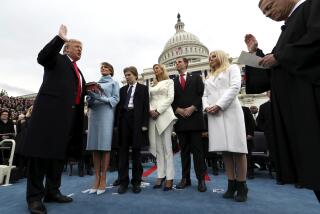College yearbook is given a lifeline
- Share via
Andrea Cranford is trying for the second time to revive the Cornhusker, the University of Nebraska-Lincoln’s student yearbook.
But this time Cranford, the school’s yearbook advisor, has help from a Dallas-based publisher whose goal is to revive a college tradition that began dying decades ago across the nation.
Last spring, Taylor Publishing approached 22 colleges and universities about helping them produce their yearbooks. Taylor would do the printing, marketing and distribution -- and take on those costs. The schools would do the writing, editing and photography. If profits exceeded costs, the schools would get a portion of the sales.
The idea came about after watching the number of yearbooks decline for nearly four decades, said Alan Heath, Taylor’s vice president of collegiate sales. In the 1960s, students became more involved in extracurricular activities and took on jobs to pay for tuition; they decided they didn’t need the additional expense of the keepsake, he said.
The schools on their own simply couldn’t market and sell the books at a cost that would cover expenses, Heath said. Taylor has priced each book between $75 and $85.
Nebraska’s last attempt at reviving its book, which began in 1999 and failed after three years, left Eileen Chalupa convinced that she and her fellow Cornhusker staff members simply weren’t able to put enough effort into marketing to make the book successful.
“Our sales were really bad; our costs were pretty high,” said Chalupa, who was editor in 2001.
UCLA thinks having Taylor market its Bruin Life could lead to more of its 25,000 undergraduates buying copies, said Arvli Ward, director of student media. In the past, fewer than 2,000 yearbooks have been sold each year.
Ward said he didn’t hesitate to take Taylor up on its offer.
“I basically get a risk-free yearbook,” Ward said. “After a while, people are going to think that this is the only way to produce a college yearbook.”
Taylor is now approaching an additional 400 colleges and universities for the program’s second year, Heath said.
The company uses direct mail and telemarketing to pitch the yearbooks to parents of college students. Taylor targets parents, Heath said, because they may be more aware than their children of the future sentimental value of yearbooks.
Taylor asks parents to update their children’s personal information -- hometowns, majors and activities -- to be included in the yearbook’s index. The company then asks the parents to order books.
Although final sales numbers were not yet available, Heath said that in nearly every case, the number of orders at participating colleges has exceeded previous years’ orders.
More to Read
Sign up for our Book Club newsletter
Get the latest news, events and more from the Los Angeles Times Book Club, and help us get L.A. reading and talking.
You may occasionally receive promotional content from the Los Angeles Times.









